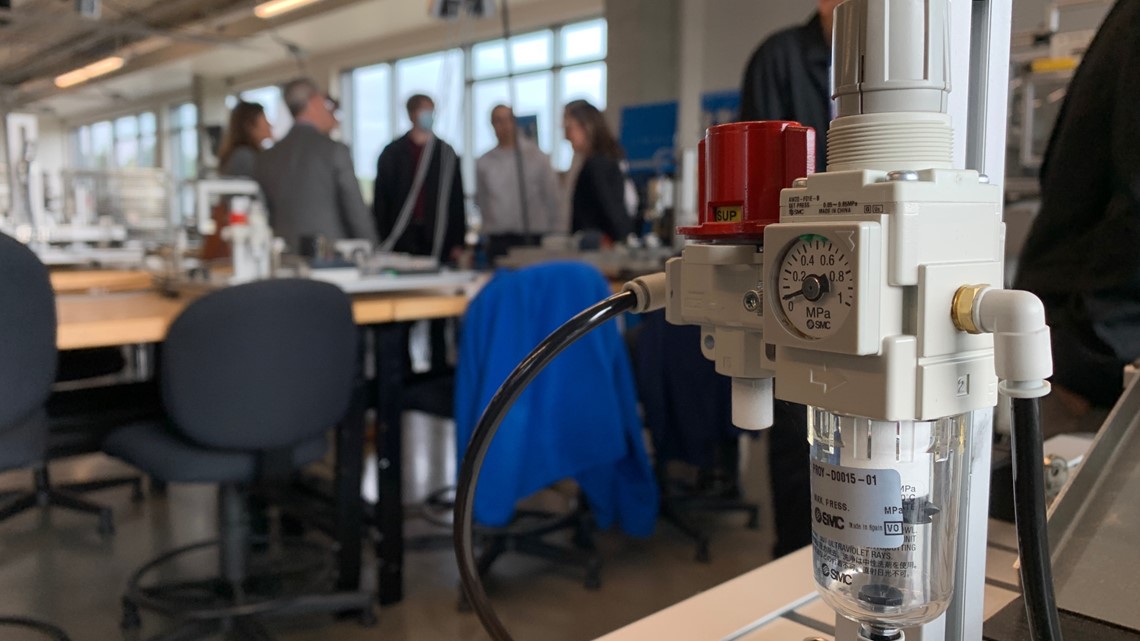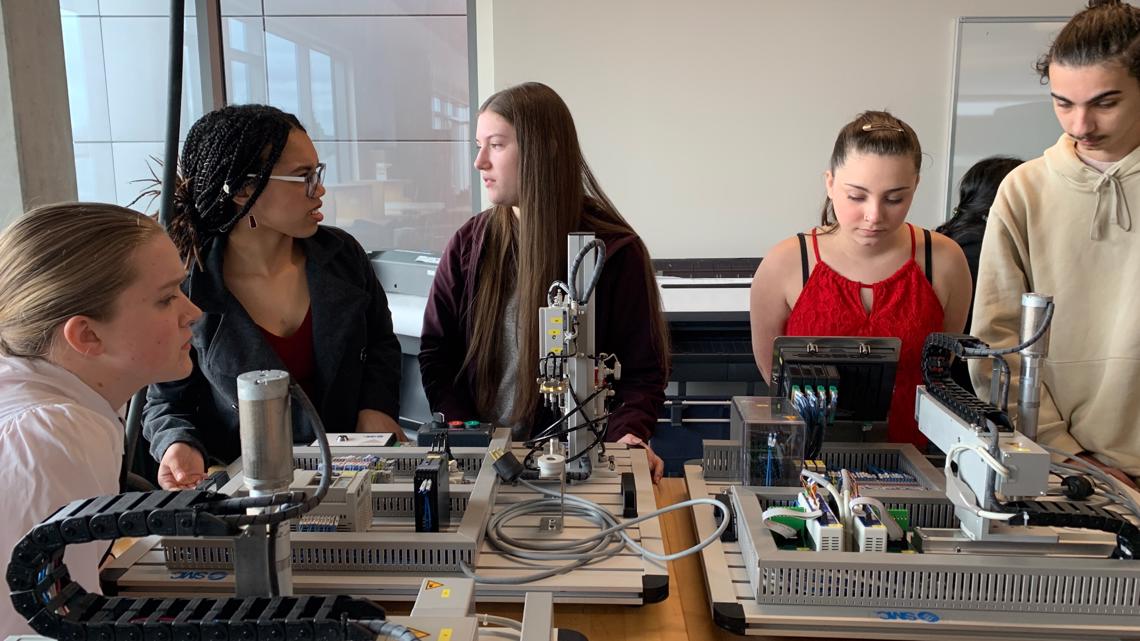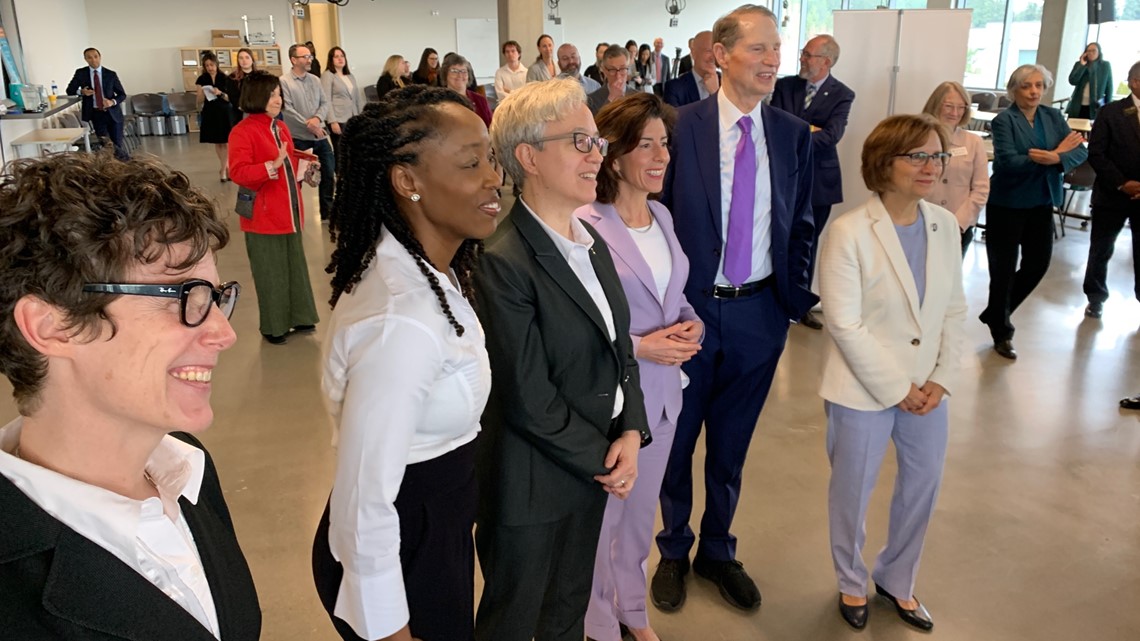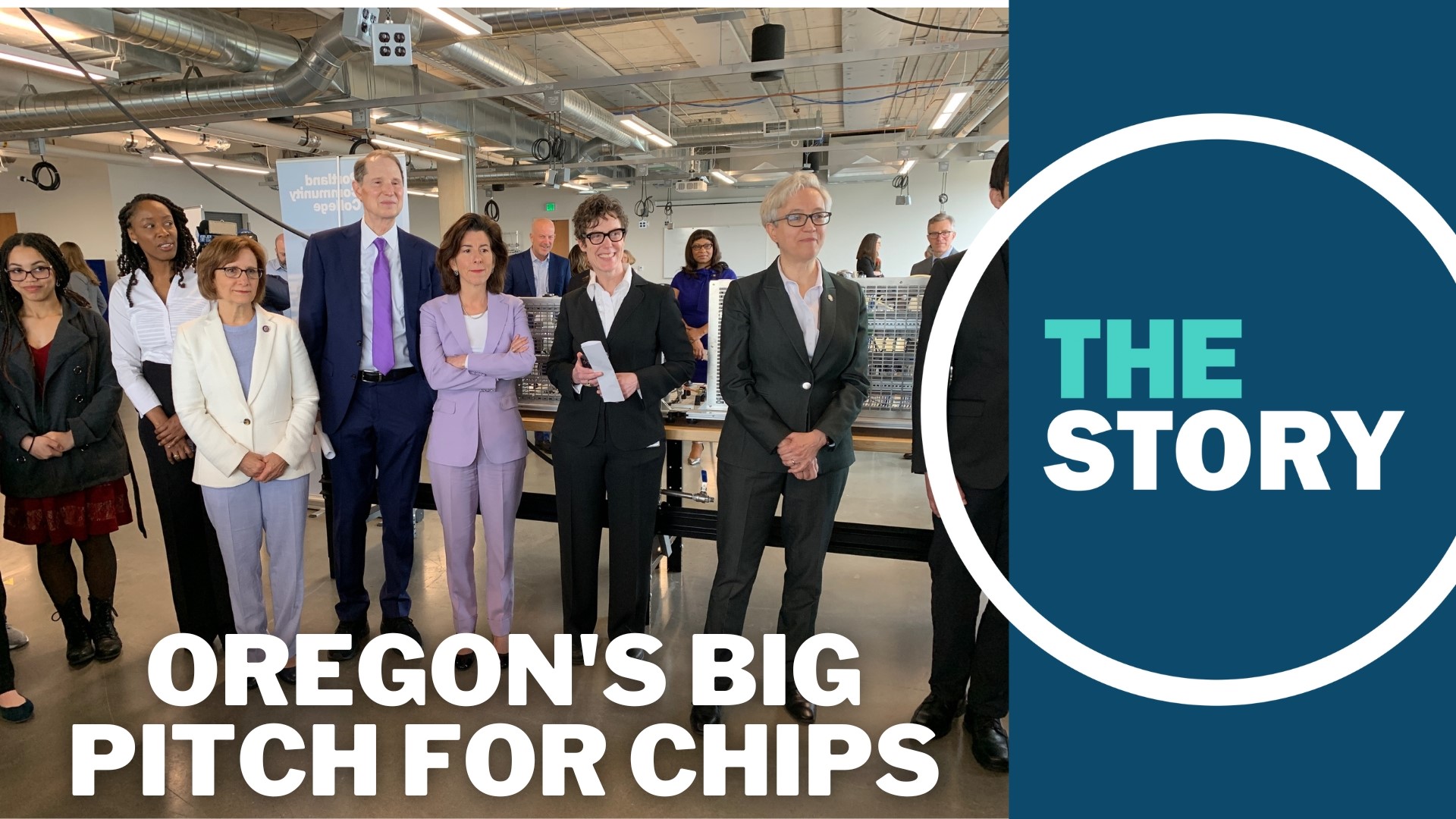PORTLAND, Ore. — U.S. Secretary of Commerce Gina Raimondo paid a visit to Oregon on Wednesday, meeting with state and tech industry leaders to discuss the $52 billion federal CHIPS and Science Act and its investments in domestic semiconductor manufacturing — something that Oregon lawmakers hope the state can cash in on.
Just last week, the Oregon Senate passed a bill with bipartisan support that would set aside $210 million for Oregon businesses, local governments and public universities to give them a leg up in vying for a CHIPS windfall.
The bill also takes the unprecedented step of allowing Gov. Tina Kotek the limited ability to change some of Oregon's land use restrictions with the wave of a hand — something supporters of the bill say is necessary to put together crucial tracts of lands needed for cutting-edge semiconductor plants.
A lot of Oregon's political and business leaders think these incentives, paired with CHIPS funds, could be a huge boon for the state economy and workforce. And that's why they gathered at the Portland Community College Willow Creek campus near Hillsboro on Wednesday to meet Secretary Raimondo.
Selling the 'Silicon Forest'
On the third floor of PCC Willow Creek, equipment for the school's microelectronics program was on full display. The gear was all donated by various high-tech companies, and students learn on it to get one- or two-year certificates that help them get work at a number of local tech companies.
The equipment formed a backdrop on Wednesday for the visit from Secretary Gina Raimondo, a lawyer and venture capitalist who went on to be Governor of Rhode Island before her current appointment at the head of the U.S. Department of Commerce.


In her position, Raimondo is at the center of the CHIPS Act and its $52 billion in funding intended to spur semiconductor manufacturing in the U.S. As a result, her impression of Oregon's "Silicon Forest" is a big deal.
"I am absolutely blown away by what I've seen here. It's unbelievable," Sec. Raimondo said. "I've been to every state — I used to run a state myself — [I've] been all over the world and what I have seen here today in terms of community commitment, the breadth and depth of semiconductor companies that are here, the fact that you have your federal delegation and your governor and mayors and university presidents all together, saying, 'You know, we're in it to be successful' ... Really, I am not just saying that because I am here. It is true. It's one of the best trips I've ever had as secretary and I want to thank you for inviting me."
Earlier in the day, Sec. Raimondo had breakfast with leaders of about 20 tech companies with a presence in the region. Members of the press were not invited to that event.
At PCC, Raimondo heard from some students, then listened as school presidents discussed how they are trying to prepare students for high-tech careers.


"We are ready to deliver on the workforce needs in the CHIPS Act. At Oregon State University we are the 7th largest engineering college in the country," said OSU President Jayathi Murthy.
"We've seen the results … over the last decade, the hiring rate of our microelectronics graduates is close to 100% with top employers," said PCC President Adrien Bennings.
"We believe in preparing students for practice — so we don't focus on the theory first, we start with applied learning," said Oregon Institute of Technology President Nagi Naganathan. "That is what Oregon Tech is all about."
No matter how good the pitch, Sec. Raimondo won't be unilaterally deciding who gets the biggest handful from the CHIPS bowl. Raimondo said that scientists will help the government decide which areas of research and development need the most funding, then they will look for areas of the country with a critical mass of talent and potential for growth.
Oregon might fit the bill, but it's lost out on expansions in tech before — the memory of Intel's decision to build a $20 billion chip facility in Ohio instead of Oregon is still fresh. And Raimondo isn't making any promises just yet.
"I'll tell you this — it will be competitive, and based on what I've seen here today … I think you will be extremely competitive," she told The Story's Pat Dooris. "What you have here — 15% of all the workforce in the industry is here in Oregon. The leading companies, here in Oregon. And a governor and a congressional delegation getting behind it. There is a lot to like and I can't wait to see your applications."
Raimondo could be sincere in that assessment, or she could be doing the political equivalent of complimenting someone's home because she's there and trying to make nice. But, she said, not every state is working on its own package of CHIPS incentives like Oregon has been — and not every state has the kind of educational infrastructure that can help create a high-tech workforce.


Landlocked
Clearly many of Oregon's state lawmakers are in support of Senate Bill 4, and Gov. Tina Kotek seemed confident on Wednesday that the bill will soon be on her desk.
"The Oregon House will be passing it hopefully tomorrow or the day after and I'll sign it as soon as we can," she said.
But the portion of the bill that hands the governor powers to draw more land within Oregon's urban growth boundaries remains the most controversial aspect. Based on research consulted by the lawmakers who crafted SB 4, this most likely means land zoned for agriculture outside of Hillsboro and North Plains — land that multiple parties, including lawmakers, agreed just 9 years ago would remain farmland.
Wednesday provided Dooris his first opportunity to ask Kotek about the bill and the pushback from people who don't want to see Oregon's urban growth boundaries disrupted.
"You know, I hear those concerns — and like them, I want to maintain our farm land," Kotek said. "So what I would say is we're — that tool that's in SB 4 — we're going to be very thoughtful. We're going to talk to our natural resource agencies, our farm community. We have to see what kinds of proposals we get.
"The reality is a lot of the expansion that could happen in Oregon is within urban growth boundaries. So we don't even know what kind of proposals we're going to get. But my commitment is to make sure we do it thoughtfully and keep all those things in balance. I think we can do that. But I know they're concerned, and I want them to know we're going to do it with a lot of input from folks who care about those issues."
SB 4 isn't supposed to be the end, either. According to Gov. Kotek, the next step would be a bill that offers tax credits for the semiconductor and advanced research industries. Currently, that's Senate Bill 5, which is still in committee with no hearings scheduled.

